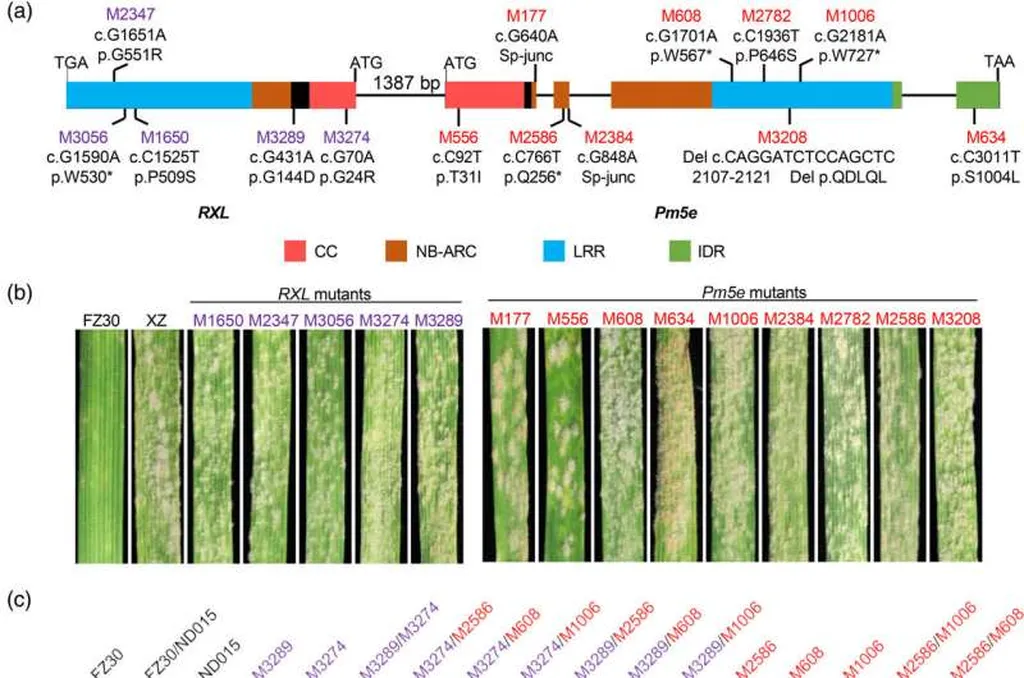In a significant stride towards enhancing disease resistance in wheat, researchers have identified and cloned a pair of genes that confer immunity to powdery mildew, a devastating fungal disease affecting both durum and common wheat. The study, led by Huagang He from the School of Life Sciences at Jiangsu University, was recently published in *Nature Communications* (translated to *Nature Communications* in English).
Powdery mildew, caused by the pathogen Blumeria graminis f. sp. tritici (Bgt), poses a substantial threat to wheat crops worldwide, leading to yield losses and increased production costs. The Pm68 gene, initially identified in the Greek durum wheat line TRI 1796, has been the focus of intensive research due to its potential to confer broad-spectrum resistance.
He and his team employed an integrated approach combining genetic mapping, association analysis, and PacBio sequencing to clone the Pm68 gene. Their findings revealed that the resistance is not conferred by a single gene but by a pair of genetically linked nucleotide-binding leucine-rich repeat (NLR)-encoding genes, dubbed Pm68-1 and Pm68-2. “This discovery is particularly exciting because it shows how two genes can work together to activate a robust defense mechanism against the pathogen,” He explained.
Transgenic assays demonstrated that Pm68-1 is the primary gene responsible for the resistance, but its activation is positively modulated by Pm68-2. Further transient expression assays in Nicotiana benthamiana leaves suggested that Pm68-2 likely enhances Pm68-1’s function through its N-terminal coiled-coil (CC)-like domain. This intricate interplay between the two genes highlights the complexity of plant immune systems and offers a blueprint for future genetic engineering efforts.
The evolutionary analysis traced the origin of the Pm68 genes to a specific subpopulation of wild emmer, shedding light on the genetic diversity that can be harnessed for crop improvement. Importantly, the introgression and transgenic wheat lines carrying the Pm68 genes showed no significant negative effects on major agronomic traits, indicating that the resistance can be achieved without compromising yield or quality.
The implications of this research are profound for the agricultural sector. Powdery mildew-resistant wheat varieties could significantly reduce the reliance on chemical fungicides, leading to more sustainable and environmentally friendly farming practices. “This breakthrough not only enhances our understanding of plant immunity but also paves the way for developing disease-resistant wheat varieties that can thrive in diverse environmental conditions,” He noted.
The study’s findings were published in *Nature Communications*, a prestigious journal known for its rigorous peer-review process and high standards of scientific excellence. This publication underscores the significance of the research and its potential to shape future developments in the field of plant pathology and crop improvement.
As the global population continues to grow, the demand for food security becomes increasingly urgent. The identification and cloning of the Pm68 genes represent a critical step towards achieving this goal. By leveraging advanced genetic techniques and a deeper understanding of plant immune systems, researchers are paving the way for a future where crops are not only more resilient but also more productive and sustainable. This research not only benefits the agricultural sector but also has broader implications for food security and environmental conservation.

